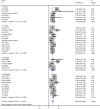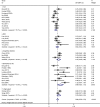Meta-Analysis of the Association between Tea Intake and the Risk of Cognitive Disorders
- PMID: 27824892
- PMCID: PMC5100989
- DOI: 10.1371/journal.pone.0165861
Meta-Analysis of the Association between Tea Intake and the Risk of Cognitive Disorders
Abstract
Background: Alzheimer's disease is a common neurodegenerative disorder in elderly. This study was aimed to systematically evaluate the association between tea intake and the risk of cognitive disorders by meta-analysis.
Methods and findings: PubMed, Embase and Wanfang databases were systematically searched and a total of 26 observational studies were included in this study. Odds ratios (ORs) and the corresponding 95% confidence intervals (CIs) were calculated and pooled by using fixed or random effects models according to the degree of heterogeneity.
Results: The overall pooled analysis indicated that tea intake could significantly reduce the risk of cognitive disorders (OR = 0.65, 95%CI = 0.58-0.73). Subgroup analyses were conducted based on study design, population, frequency of tea drinking and type of cognitive disorders. The results showed that tea drinking was significantly associated with the reduced incidence of cognitive disorders in all of subgroups based on study design and frequency of tea drinking. In particular, tea drinking was inversely associated with the risk of cognitive impairment (CoI), mild cognitive impairment (MCI), cognitive decline and ungrouped cognitive disorders. Moreover, for population subgroups, the significant association was only found in Chinese people.
Conclusion: Our study suggests that daily tea drinking is associated with decreased risk of CoI, MCI and cognitive decline in the elderly. However, the association between tea intake and Alzheimer's disease remains elusive.
Conflict of interest statement
The authors have declared that no competing interests exist.
Figures







References
-
- Durga J, Van Boxtel MP, Schouten EG, Kok FJ, Jolles J, Katan MB, et al. (2007) Effect of 3-year folic acid supplementation on cognitive function in older adults in the FACIT trial: a randomised, double blind, controlled trial. The Lancet 369: 208–216. - PubMed
Publication types
MeSH terms
Substances
LinkOut - more resources
Full Text Sources
Other Literature Sources

